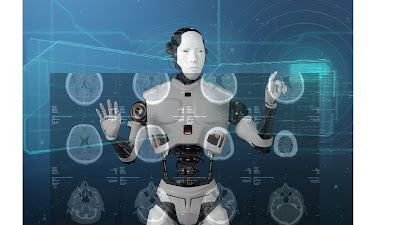1.Introduction
And so, with machine learning and data science and robots leading the way, AI is revolutionizing the diagnostic procedures of physicians, treatment building, and even patient engagement. Governments, physicians, and hospitals need to monitor shifting trends with AI if governments are ever going to unlock its potential.
2. Emergence of AI in the Medical Industry
.jpg)
Impact areas of AI:
- Hospitals: To improve the rate of treatment success, AI analyzes the medical images and identifies the disease in its early stage.
- Pharmaceuticals: AI speed up drug discovery, decreasing time and cost.
- Telemedicine: AI-powered virtual assistants and chatbots provide 24/7 care to patients, improving remote health services.
Real-World Success Stories:
- Google's DeepMind AI diagnosed eye diseases with 94% accuracy, equal to top-performing ophthalmologists. If you're interested to know more, click on the link below.
- IBM Watson Health is assisting oncologists by examining huge data sets to recommend targeted cancer therapy.
Do you know chatgpt helped a mother to find about his son’s health condition?
So, the mother visited almost 17 doctors over 3 years for her son’s chronic pain before signing up for chatgpt. She used this AI platform and explained everything about her son’s symptoms, his MRI’s. Using all that information chatgpt suggested a rare neurological condition which proved correct.
17 doctors, no answers: ChatGPT helped a mother find correct diagnosis
3. Top AI Trends in Healthcare (2025)
4. Benefits of AI in Healthcare
- Improved Diagnoses: While diagnosing diseases, AI avoids human errors which results in timely and accurate treatment
- Quicker and Efficient Processes: AI operations are quicker, leaving physicians more time to interact with patients.
- Reduced Healthcare Spending for Patients and Doctors: Efficient use of resources and prevention of duplicate use of tests enable AI to reduce the cost of healthcare.
- Improved Patient Experience and Participation: AI systems are available round the clock, leading to high activation and patient satisfaction.
5. Challenges and Ethical Issues
- Threats of Data Security and Privacy:AI is patient data-dependent, and data breach and security is a concern.
- AI Biases and Regulation Needed:AI can acquire bias from training data and suggest biased treatment. Regulation is needed to facilitate ethical AI use
- The Use of AI in Redefining Healthcare Work:Some jobs are automated by AI, and some new jobs are created in designing, monitoring, and managing AI.
6. The Future of AI in Healthcare
What the Future Will Bring for AI Innovation in the Next Decade
Treatment will be personalized for every patient and Improved natural language processing (NLP) will enable AI to better talk to patients
What Patient Care and Medical Research Will Be Like in the Future Due to AI
Real-time monitoring of health by using wearables, avoiding hospitalization, and facilitating active treatment.
7. How Companies and Workers Can Prepare for AI in Health Care
- Learning New Skills for Healthcare Workers:Physicians, nurses, and technologists must upskill themselves with new AI technology and training so that they can apply the best of AI in their practice.
- Hospitals and Clinics Intend to Utilize AI:Hospitals ought to spend on AI technology to increase care for patients.
- How Startups and Investors Can Benefit from AI Innovations:Start-ups in healthcare can integrate AI in their offerings in the future, and investors can invest in AI-driven health innovations.
8. Conclusion
AI is enhancing healthcare to become more accurate, efficient, and affordable. There are dangers, but there are also advantages. AI usage will certainly assist businesses to expand.With the advancements in technology, healthcare professionals, companies, and politicians must wake up and prepare.
🔗 Explore More
- Trapped in the Prison of Perception?
- 10 Natural Ways to Boost Immune System
- You Won't Believe What Deepseek Can Do
- Top 10 Anti-Aging Foods Backed by Science
- Best AI Tools in 2025 That Actually Save You Time
- Tired of Pleasing Everyone? Here’s the Truth No One Talks About
- Freelancing in 2025: Hidden Gems, Red Flags & Smart Tips
- Earn While You Learn: 5 Exciting Work-from-Home Jobs for College Students (No Investment Needed!)
- Deepfake Detection and AI Voice Cloning: What Every Internet User Should Be Prepared For in 2025
- Boost Your Mental Clarity and Focus Naturally: 7 Habits Backed by Neuroscience
- How to Build a Freelance Portfolio With No Clients (Free Methods That Work)


.jpg)

.png)

.jpg)


0 Comments